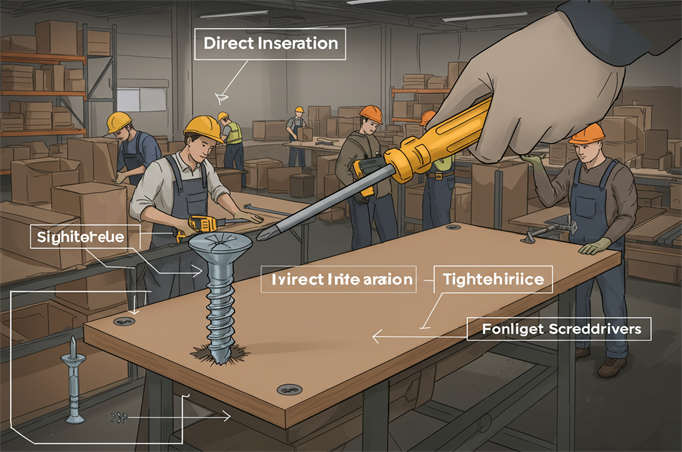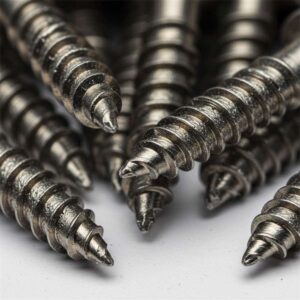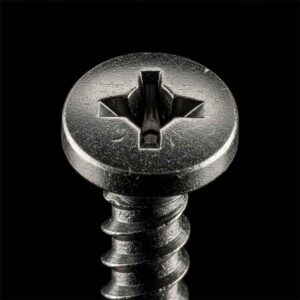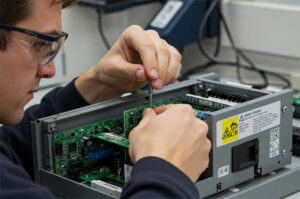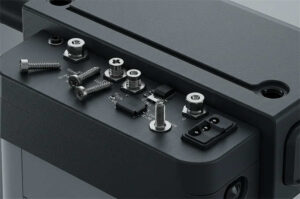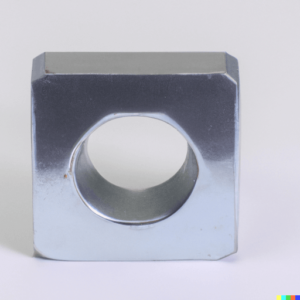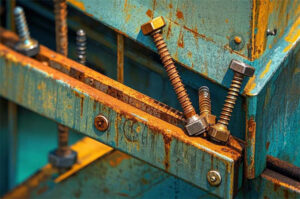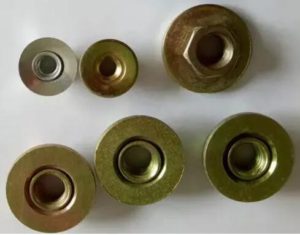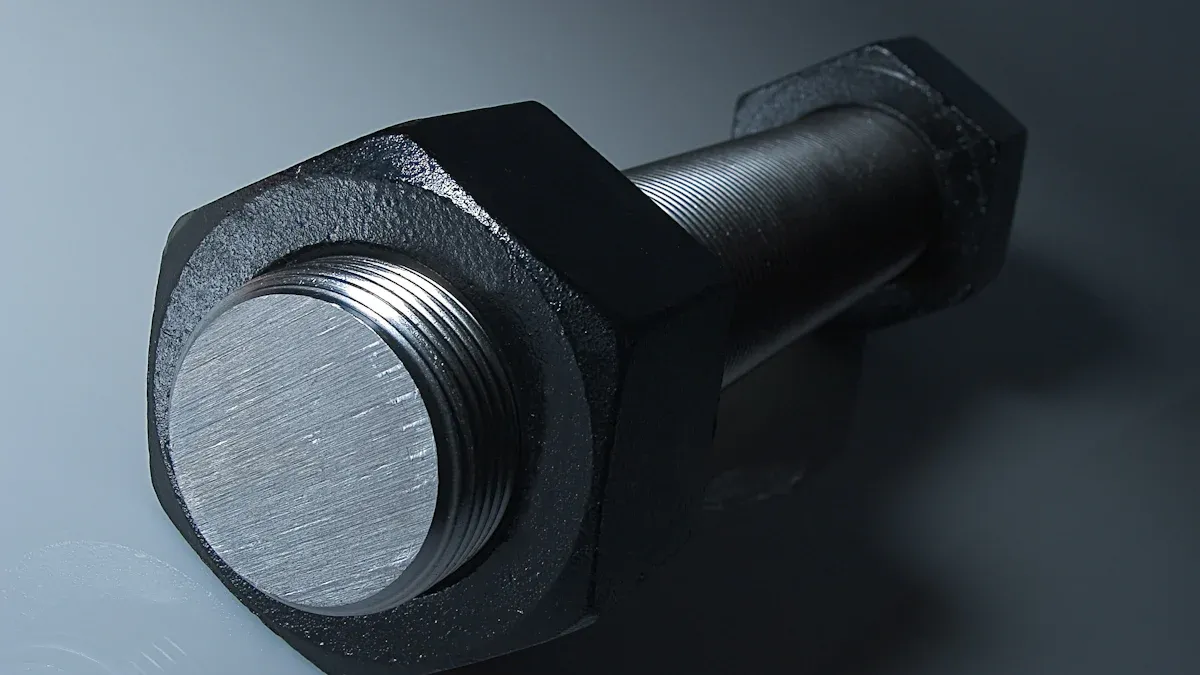
If you want the best protection for self tapping screws, stainless steel and advanced multilayer coatings give the most corrosion resistance. You can make screws last longer and work better by picking the right corrosion-resistant surface treatment. When you choose self-drilling screws, check both the base material and the self tapping screw coating.
- Stainless steel does not rust easily in many places.
- Zinc lamella and polymer coatings block moisture very well.
You get better results when you match the coating to what you need.
Key Takeaways
- Pick stainless steel or special coatings for strong corrosion resistance in self-tapping screws. Use the right screw coating for your project to keep things safe and long-lasting, especially if it is wet or salty. Think about the coating type, like zinc plating or polymer, depending on where you will use the screws. This helps protect them better. Look for corrosion resistance standards and salt spray test ratings to make sure the screws work well in hard conditions. Check screws often in tough places to find corrosion early and keep your project safe.
Why Corrosion Resistance Is Essential
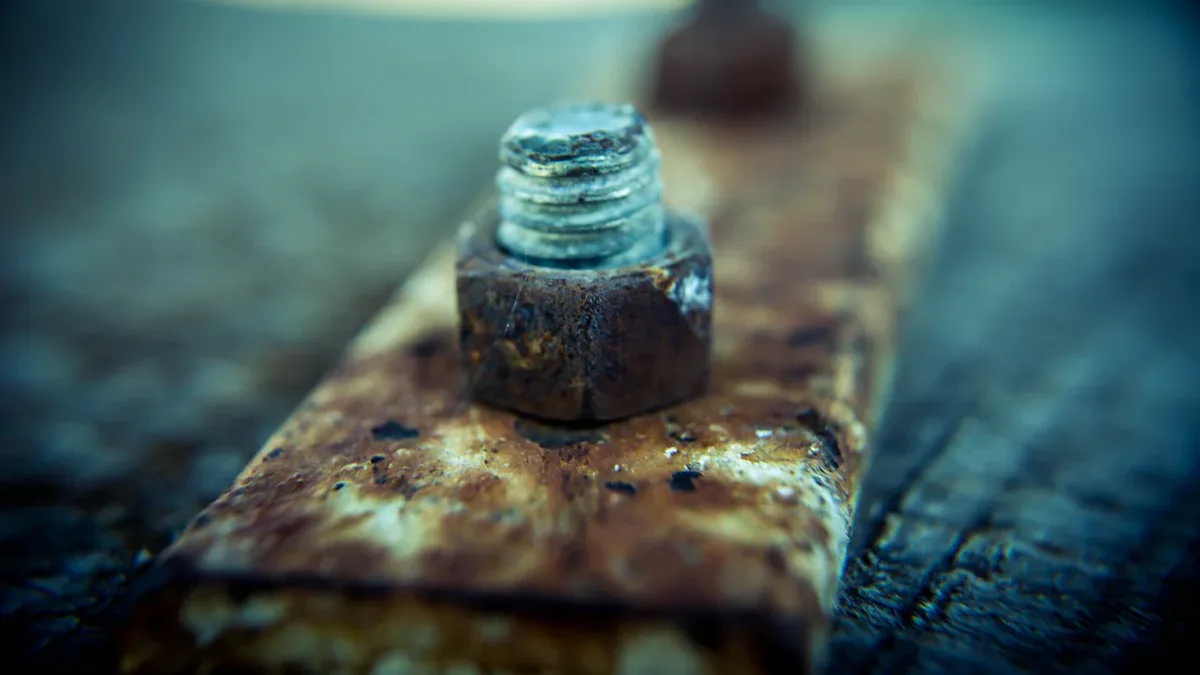
Corrosion Risks for Self Tapping Screws
Self tapping screws can have problems in tough places. Water, salt, and chemicals can hurt the surface of sheet metal screws. Corrosion slowly eats the metal and makes the screw weak. If you pick corrosion resistant screws, your projects stay safe from rust and harm. Class 1 corrosion resistant screws work well in wet or damp places. Some screws, like stainless steel, fight rust without extra coatings. You should look at the area before picking sheet metal screws. Using regular screws in wet or salty spots can make them break early.
Tip: Always pick corrosion resistant screws that fit your project’s needs. This helps you save money and avoid fixing things later.
Effects on Durability and Safety
Corrosion does more than change how screws look. It can make your structure less strong and safe. Using corrosion resistant screws keeps your projects safe for longer. Sheet metal screws with good coatings or made of stainless steel do not rust and hold tight. The table below shows how corrosion changes strength and safety in building projects:
| Feature | Description |
|---|---|
| Corrosion Resistance | The stainless steel head does not rust, so it keeps its strength. |
| Load-Bearing Capacity | The carbon steel tip holds tight and keeps things steady. |
| Durability | Bimetal screws can last over 20 years, so they are reliable for a long time. |
Pick corrosion resistant screws for any job that needs to last. Sheet metal screws with the right coating or material help stop accidents and keep things safe. Good coatings block water and chemicals, so screws stay strong. You get better results when you use corrosion resistant screws where rust can happen.
Self Tapping Screw Coating Types
Zinc Plating
Zinc plating is a common coating for self tapping screws. It puts a thin zinc layer on steel screws to stop rust. Zinc and zinc-tin coated screws slow rust by making a barrier. Zinc plating gives basic protection but works best inside or in dry places. It does not last long in wet or salty spots.
Hot-Dip Galvanizing
Hot-dip galvanizing gives screws a thicker zinc layer than plating. Screws are dipped in hot zinc, making a strong shield. This makes zinc and zinc-tin coated screws resist rust better. Use galvanized screws with G90 galvanized or ZMAX Simpson wood connectors. They are good for treated wood. The thick layer helps screws last longer outside.
Zinc Lamella Coatings
Zinc lamella coatings use tiny zinc flakes in layers. These layers block water and chemicals well. Zinc and zinc-tin coated screws with lamella coatings work in tough places. Use this coating for outdoor jobs or where there is lots of water.
Polymer Coatings (PEEK, PVDF, PTFE)
Polymer coatings like PEEK, PVDF, and PTFE protect screws from rust. These coatings stop chemicals and water from hurting the screws. Use self-drilling screws with polymer coatings in chemical plants or near the sea. Polymer coatings also make it easier to put in screws because they lower friction.
Stalgard and Multilayer Coatings
Stalgard coatings give very good protection from rust. Pick Stalgard Coating for hard fasteners or Stalgard Standard Class 4 Coating. Both types have even thickness and low friction, so you can install screws fast. Stalgard coatings keep self-drilling screws strong for a long time.
Stainless Steel vs. Coated Steel
You can use stainless steel screws or coated steel screws. Stainless steel does not need extra coatings to stop rust. Coated steel screws use a coating to fight rust. Compare the protection before you pick one. Stainless steel works in many places. Coated steel can cost less and still stop rust.
Tip: Always pick the right self tapping screw coating for your project. This helps screws last longer and work better.
| Coating Type | Main Benefit | Best Use Case |
|---|---|---|
| Zinc Plating | Basic corrosion resistance | Indoor, dry areas |
| Hot-Dip Galvanizing | Thick zinc shield | Outdoor, treated lumber |
| Zinc Lamella | Layered moisture barrier | Harsh environments |
| Polymer | Chemical resistance | Chemical plants, marine |
| Stalgard/Multilayer | Uniform, strong protection | High-performance jobs |
| Stainless Steel | No rust, no coating needed | Most environments |
Corrosion-Resistant Surface Treatment Standards
ASTM and ISO Standards
You need to know the main standards that guide corrosion-resistant surface treatment for self tapping screws. These standards help you check if a screw meets the right level of corrosion protection. ASTM and ISO set rules for how manufacturers test and rate coatings. ASTM F1941 covers the requirements for electrodeposited coatings on fasteners. ISO 898-1 sets the mechanical properties for screws. ASTM F1575 gives you the test methods for fastener corrosion resistance. When you see these standards, you can trust the coating will protect against corrosion.
| Standard | Compliance |
|---|---|
| ISO 898-1 | Yes |
| ASTM F1941 | Yes |
| ASTM F1575 | Yes |
Tip: Always look for screws that follow these corrosion resistance standards. This helps you get better results in tough environments.
Salt Spray Test Ratings
Salt spray tests show how well a coating protects against corrosion. You can use these ratings to compare different coatings. In a salt spray test, screws go into a chamber with salty mist. The test measures how long the coating stops rust from forming. If a screw lasts over 500 hours in the test, it has strong corrosion resistance. Polymer coatings and zinc lamella coatings often score high in these tests. You should check salt spray ratings before you choose screws for outdoor or marine jobs.
- Salt spray test steps:
- Place screws in the chamber.
- Spray salty mist for set hours.
- Check for rust or damage.
Coating Thickness and Classification
Coating thickness matters for corrosion protection. Thicker coatings block water and chemicals better. You can find coating thickness in product specs or standards. ASTM F1941 and ISO 898-1 list the minimum thickness for each type of coating. Thin coatings work for indoor jobs. Thick coatings help in places with lots of moisture or salt. You should match the coating thickness to your project needs. This helps you get the best corrosion-resistant surface treatment and keeps screws strong for longer.
Note: Always check the coating classification. This tells you how the coating will perform in your environment.
Comparing Corrosion-Resistant Capability
Protection Levels by Coating Type
It is important to know how coatings protect screws from rust. Each coating type has its own way of stopping corrosion. Some coatings work best in hard places, like near the ocean. Here is a list to help you see which coatings protect the most:
- Ceramic silver coating gives very strong rust protection. Screws with this coating last over 1000 hours in salt spray tests. You can use these screws near the sea. The coating stays strong, even if it gets scratched.
- 316 stainless steel screws have molybdenum. This helps stop pitting corrosion in saltwater. These screws last longer in marine places.
- Hot-dip galvanizing makes a thick layer on screws. This gives strong protection for outside jobs.
- Zinc lamella coatings use layers of zinc flakes. These coatings block water and chemicals well.
- Polymer coatings, like PTFE and PVDF, stop chemicals and water. You can use these in chemical plants or near the sea.
- Zinc plating gives basic protection. It works best inside or in dry places.
Note: Pick class 1 corrosion resistant screws for wet or damp places. These screws have coatings that meet strict rules for rust protection.
Here is a table that shows how well each coating protects screws and where to use them:
| Coating Type | Salt Spray Protection (Hours) | Best Use Case |
|---|---|---|
| Ceramic Silver | 1000+ | Marine, coastal |
| 316 Stainless Steel | 1000+ | Marine, coastal |
| Hot-Dip Galvanizing | 500+ | Outdoor, treated wood |
| Zinc Lamella | 500+ | Harsh, wet environments |
| Polymer (PTFE, PVDF) | 1000+ | Chemical, marine |
| Zinc Plating | 48-96 | Indoor, dry |
Expected Lifespan and Durability
You want screws that do not rust and last a long time. How long they last depends on the coating and where you use them. Some coatings help screws last many years. Others only work for a short time in tough places.
- 316 stainless steel screws last over 10 years in wet, coastal places. You do not need to change them often.
- Ceramic silver coating makes screws last 3-5 times longer than normal coatings. You save money on repairs.
- Zinc lamella coated screws last 1–3 years near the sea. You may need to check them more often.
- Hot-dip galvanized screws can last over 50 years in many places. The thick coating keeps the screw safe for a long time.
- Zinc plated screws last 10–20 years inside. The thin coating does not work well outside.
- Polymer coatings help screws last over 1000 hours in salt spray tests. You can use them in chemical plants or near the sea.
Here is a table that shows how long screws last in coastal places:
| Screw Type | Expected Lifespan in Coastal Areas |
|---|---|
| Coated Screws | 1–3 years |
| Stainless Steel Screws | Over 10 years |
Tip: Use stainless steel screws for outside jobs. These screws need less care and last longer.
Cost and Value Comparison
You need to think about cost and value when picking screws. Some coatings cost more but protect better. Others are cheaper but do not last as long.
- Ceramic silver coating costs more than zinc plating. You get much better protection and longer life.
- 316 stainless steel screws cost more. You save money because you do not need to change them often.
- Hot-dip galvanizing costs more than zinc plating. The thick coating gives better protection and value for outside jobs.
- Zinc lamella coatings give good protection at a fair price. You can use them in tough places.
- Polymer coatings cost more than basic coatings. You get strong chemical resistance and long-lasting protection.
- Zinc plated screws are the cheapest. You should use them only inside and in dry places.
| Coating Type | Cost Level | Value for Corrosion Protection |
|---|---|---|
| Ceramic Silver | High | Excellent |
| 316 Stainless Steel | High | Excellent |
| Hot-Dip Galvanizing | Medium | Very Good |
| Zinc Lamella | Medium | Good |
| Polymer | Medium-High | Very Good |
| Zinc Plating | Low | Basic |
Note: Match the coating to your budget and where you will use the screws. Picking the right screws helps you avoid repairs and keeps your projects safe.
Corrosion-resistant capability depends on the coating, where you use the screws, and your budget. Always check how well the coating protects before you pick screws for your project.
Key Factors in Self Tapping Screw Coating Performance
Adhesion and Barrier Effectiveness
You need a coating that sticks well to the screw. If the coating stays on, it protects better. When you put the screw into hard things, the coating should not come off. If the coating cracks or peels, rust can start fast. Barrier effectiveness means the coating stops water, salt, and chemicals from touching the metal. Polymer coatings like PTFE or PVDF make a strong shield. These coatings help screws fight rust in tough places. Always check if the coating sticks well and blocks things. This helps the screw last longer and work better.
Porosity and Environmental Suitability
Porosity means tiny holes in the coating. Less porosity gives better protection. If there are many holes, water and chemicals can get in. This can cause rust. Pick coatings with few holes for wet or salty places. Zinc lamella and polymer coatings have low porosity. They work well in hard environments. Match the coating to where you use the screw. For example, use corrosion resistant coatings in marine or chemical plants. This helps you get the best protection for your project.
Tip: Coatings with few holes protect better outside and in wet places.
Material Compatibility
Some coatings do not work with every screw material. You should check if the coating fits the screw and the job. Advanced coatings like polymer or ceramic work well with titanium alloy screws and exterior screws. These screws fight rust and work well outside.
| Material Type | Corrosion Resistance | Compatibility with Coatings | Additional Notes |
|---|---|---|---|
| Titanium Alloy Screws | High | Various substrates | Lightweight, high tensile strength, anodized options |
| Exterior Screws | Moderate to High | Advanced coatings | Designed for outdoor use, moisture and chemical resistance |
- Exterior screws use strong coatings like ceramic or polymer.
- These coatings help stop rust and keep out water.
- They work with many materials, so you can use them outside.
When you pick a screw, check the coating and make sure it fits the screw and the place. This helps the screw last longer and stay strong.
Selecting the Right Coating
Environmental and Application Needs
Think about where you will use these screws. Some places make metal rust faster than others. If you work near the ocean, salty air can cause rust quickly. High heat and wet air also make rust happen faster. Pollution, like sulfur dioxide, makes the air even worse for metal. You should pick a coating that fits the place you are working in. The table below shows what things can cause rust:
| Key Factors Affecting Corrosion Resistance | Description |
|---|---|
| Temperature-Humidity Complex | Changes how fast metal rusts. |
| Pollution by Sulfur Dioxide | Makes the air more harmful for metal. |
| Airborne Salinity | Raises the chance of metal rusting. |
You also need to think about your project. If you use sheet metal screws for roofs or walls, pick a coating that blocks water and sunlight. Strong coatings like zinc plating, ceramic, or epoxy help screws last longer. Stainless steel or coated screws work best in tough places, like rooftops or chemical plants.
Budget Considerations
Pick screws that fit your budget. Big jobs need you to plan costs. Make a list of what you need, like how long screws should last and what kind of rust they will face. Ask manufacturers about different coatings. Make a chart to compare how each coating works and how much it costs. Try a few coatings on a small part of your job before you buy a lot.
- Make clear rules for your project.
- Talk with manufacturers about choices.
- Compare how well coatings work and their price.
- Test coatings before using them everywhere.
Best Practices for Selection
Follow some good steps to pick the right screws. In places near the sea or with lots of rust, choose class 4 coated screws. Always check the place before you decide. For outside jobs or places with lots of water, use stainless steel or special coatings. Ask fastener suppliers for help. They can help you find the best coating for your needs. Good companies offer coatings that meet rules, so your screws stay strong.
Tip: Always match the coating to your project and the place you work. This helps your screws last longer and keeps your work safe.
You can see that zinc plating, hot-dip galvanizing, and polymer coatings protect screws in different ways. The table below shows how each coating works:
| Coating Type | Corrosion Resistance Description |
|---|---|
| Zinc Plating | Good at stopping rust, but does not last long. |
| Hot-Dip Galvanizing | Stops rust better, but can fail if scratched. |
| Polymer Coatings | Very strong against rust and lasts a long time. |
Pick the right surface treatment for your weather and budget. If you live near the ocean or in wet places, use stainless steel or special coatings. These give better rust protection. Always check the rules and talk to suppliers for help. When you pick screws, look at how they fight rust, what they are made of, and if they keep things safe for a long time. This helps you avoid trouble and keeps your work strong.
- Things that matter for strong and safe screws:
- What the screw is made of
- The kind of threads
- How big the screw is
- How well it fights rust
- How much weight it can hold
- How you put it in
Tip: Choose coatings that match your weather and project. You get better rust protection and save money later.
FAQ
What makes self tapping screws resist corrosion?
You get corrosion resistance from special coatings or stainless steel. These coatings block water and chemicals. Stainless steel fights corrosion without extra layers. You should pick screws with strong protection for places with moisture or salt.
How do I know which coating is best for corrosion protection?
You should check the environment first. Use zinc plating for dry areas. Pick hot-dip galvanizing or polymer coatings for outdoor or wet places. Stainless steel works well in most spots. Always match the coating to the corrosion risk.
Can corrosion-resistant screws work in coastal areas?
Yes, you can use screws with ceramic, polymer, or zinc lamella coatings in coastal areas. Stainless steel also works well. These options protect against corrosion from salty air and water. You should check salt spray test ratings for extra safety.
Do corrosion-resistant coatings affect screw strength?
Most coatings do not change the strength of the screw. You get better corrosion protection without losing load-bearing power. Stainless steel screws keep their strength and resist corrosion. Always check product specs for details.
How often should I check screws for corrosion?
You should inspect screws every year in tough environments. Look for rust or damage. Replace screws if you see corrosion. Regular checks help you keep your projects safe and strong.
Tip: You can ask suppliers for advice on corrosion-resistant coatings for your project.
